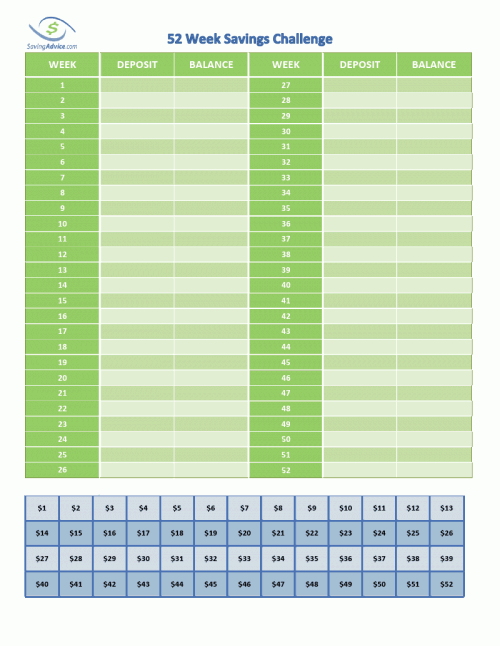 If you’re looking for a great way to start saving money right now that will net you over $1300 in 1 year, we’ve put together an easy system which offers a good amount of flexibility to give you the greatest chance of success. This is a hybrid of the original 52 week money challenge, but it puts more control in your hands. So, here is how to do the 52 week savings challenge.
If you’re looking for a great way to start saving money right now that will net you over $1300 in 1 year, we’ve put together an easy system which offers a good amount of flexibility to give you the greatest chance of success. This is a hybrid of the original 52 week money challenge, but it puts more control in your hands. So, here is how to do the 52 week savings challenge.
How To Do The 52 Week Savings Challenge
In a lot of ways, the 52 Week Savings Challenge is similar to a game of Yahtzee. There are 52 weeks in the year with a dollar amount corresponding to all 52 weeks. Each week your goal is to try to save the highest amount that is still available from the bottom numbers.
While the highest dollar amount is the goal, there will certainly be weeks when you aren’t able to save the full amount. Whatever amount you are able to save each week, that is the number that you write and then cross that number off the bottom.
Your goal for the first week is to save $52, but even if you aren’t able to reach that amount, you haven’t failed. In this way it is similar to Yahtzee. Whenever you roll the dice, you ultimate goal is to try to get a Yahtzee, but depending on how things are going with the rolls, you attempt to get the best number you can from the still open hands on your card. In this challenge you’re doing the same thing, but just with the dollar amounts you’re able to save each week.
For example, say that you are able to save $42 the first week you begin the challenge. You would X out the $42 at the bottom of the chart and place it in the deposit line for week one and that would also be your balance since it is the first week. In week two you are able to save $18. You X out the $18 at the bottom of the chart and place $18 in the deposit line. You then would place $60 as the balance ($42 + $18) for week two. In week three you’re able to save $52 which you cross off, add and come away with a balance of $112. In week four, you have a tough week and are only able to save a single dollar. You cross it off, deposit the $1 and up your balance to $113.
Because you choose the amount to save each week in relation to your finances (always with the goal to try to save the top dollar amount still available at the bottom of the chart), you don’t fail the challenge just because you have a few rough weeks. We all have good weeks and we all have bad weeks and they don’t come about uniformly. By trying to save the most you can each week which takes into account the financial realities of that week, it gives you much needed flexibility and a better chance of success compared to having a set dollar amount you must save each week that corresponds to that specific week.
Advantages Of The 52 Week Savings Challenge
Another advantage is that there is no need to begin this challenge at the beginning of the year, but you can start at any time. Week one is the first week you begin (as opposed to the first week of the calendar year). That means that if you come across this challenge in the summer, there is not need to wait half a year to begin. You can start today. Simply designate one day of the week when you will make the deposit and you are ready to go for an entire year from that point.
Here is an 8.5 by 11 of the challenge, you can print it out and put it where you can mark off the numbers on the bottom.
Get Started, Get in the Savings Habit
The most important aspect of this challenge is that you simply begin doing it. Even if the first few weeks your saving amount is low, you are getting yourself into the habit of saving. As you become comfortable with that habit, you should find more ways to save that will help you knock off those bigger numbers always knowing that you have some small numbers there as well if finances get tight some weeks. Once in the habit you may find it easy to save even more.
Improve Your Income
while most of this article is about how to do the 52 week savings challenge, a lot of people have a problem coming up with enough money to actually save. The good news is there are endless ways to improve your income. Here are some ideas that will work if you put the time into making them work.
- Maximize Your Professional Options. Since most people’s income comes from their job, you could always improve your income by asking for a raise, getting a promotion, changing careers or taking on a second job.
- Sell Your Extra Internet Bandwidth. Most people don’t use all of the data in their internet plans. But, did you know that the data in your plan has economic value? If you have unlimited internet or you aren’t using all of your bandwidth, you can sell the gigabytes you aren’t using. Selling your extra internet bandwidth isn’t a huge money maker, but it is largely passive and it works. There three legitimate companies that will help you: EarnApp, SavvyConnect. and HoneyGain. They all pay about $5 per month. You can get all three without your laptop being impacted or any problems with your ISP.
- Invest For Extra Money. A great way to improve your income is to buy income producing investments. Stock, bonds and exchange traded funds are a good way to get started doing this. What you have to do is get an investing app, open an account and start buying. Robinhood is one of the better apps out there- they have a really first rate tech stack and millions of users. Plus, they give you free stock for signing up. Here is what you do:
 Sign up with this link
Sign up with this link
 Get approved
Get approved
 Link a bank, skip the deposit
Link a bank, skip the deposit
 Claim free stockAfter that you just have to decide which securities you want to invest in.
Claim free stockAfter that you just have to decide which securities you want to invest in.
Once you have the extra money earned, all you have to do is put the extra income you make into your savings account, so these ideas should help you save the most you can.
Do It Yourself And Get Some Help
You can print the challenge sheet by clicking here (pdf). I encourage you to give it a try, and I would love to hear any feedback you have about it. If you are looking for support as you do this challenge, join the forum group where you can share how your challenge is going with others. There are also now kids versions of this challenge which replace the dollar amount with quarters, dimes, nickels or pennies depending on how old your child is and the amount that he wants to save.
Read the full article here








